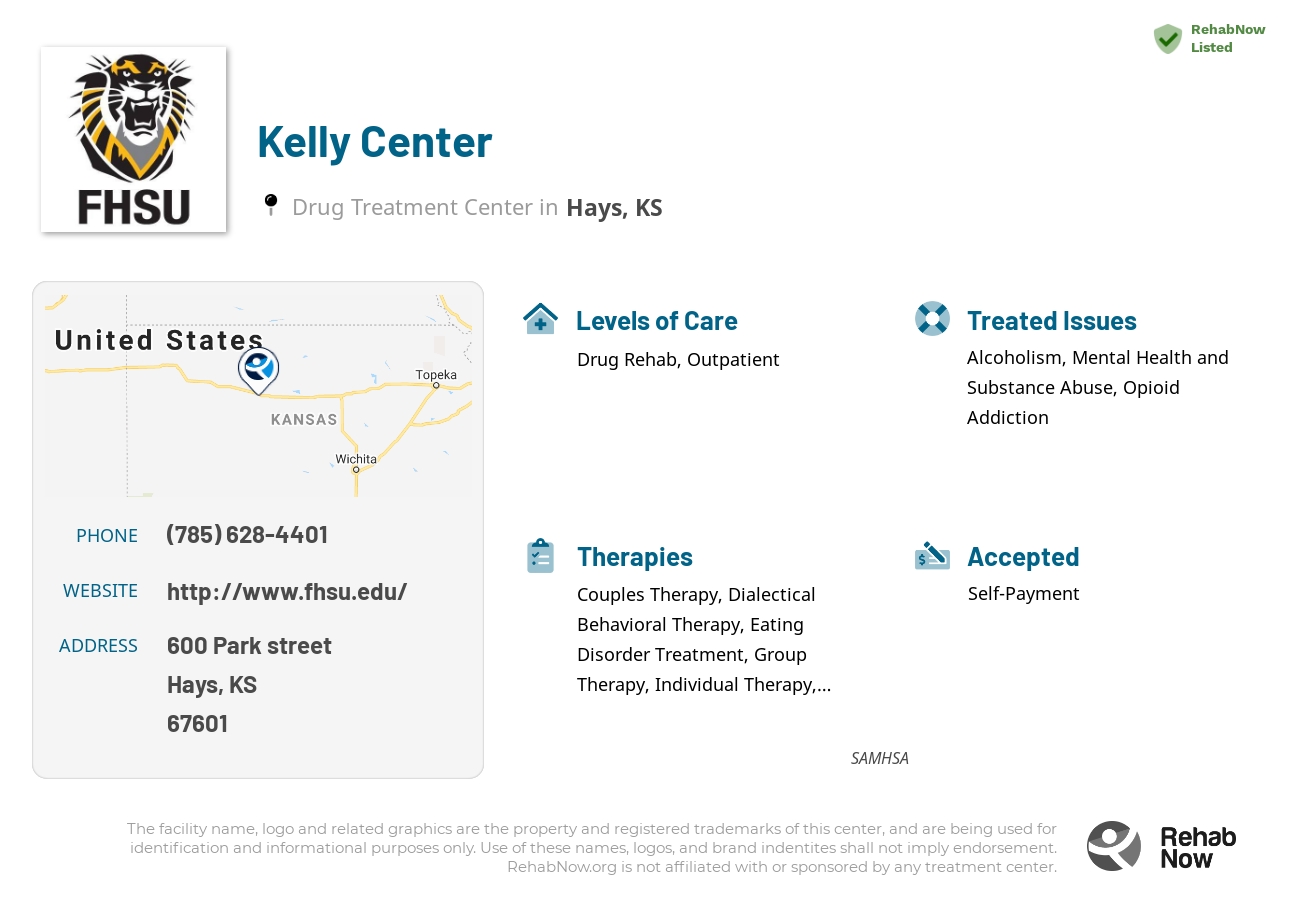About This Kansas Facility
Kelly Center is an Addiction Treatment Facility located in Hays, Kansas. Established in 1902, this center has a long-standing history of providing support and treatment for individuals suffering from various forms of addiction. With a focus on helping individuals overcome alcoholism, opioid addiction, dual diagnosis, eating disorders, and drug addiction, Kelly Center offers comprehensive programs tailored to meet the unique needs of each patient. As an accredited facility by the Substance Abuse and Mental Health Services Administration (SAMHSA), Kelly Center maintains high standards of care and adheres to evidence-based practices in their treatment approach. This certification attests to the center's commitment to providing effective treatment and support for individuals struggling with substance abuse.
At Kelly Center, individuals can benefit from a range of services designed to address addiction and substance abuse in a holistic manner. The facility offers drug rehab programs with a focus on detoxification, counseling, and therapy to help individuals overcome physical and psychological dependencies. Additionally, Kelly Center provides outpatient levels of care, allowing individuals to receive treatment while maintaining their daily routines and responsibilities. Through individual and group therapy sessions, patients can explore the underlying causes of their addiction and develop coping strategies for long-term recovery. Moreover, the center recognizes the importance of addressing co-occurring mental health conditions, offering dual diagnosis treatment for individuals with both addiction and mental health disorders. With a multidisciplinary team of professionals and evidence-based practices, Kelly Center strives to provide individuals with the tools and support necessary to achieve lasting recovery.
Genders
Ages
Modality
Additional
Accreditations
SAMHSA
Conditions and Issues Treated
Many people who struggle with opioid addiction need to attend specific programs like methadone , Suboxone or Vivitrol clinics.
These types of programs will provide the patient with legal, prescription medications that can help them overcome their cravings for illegal opioids like heroin or fentanyl . If the patient has a chronic condition like Hepatitis C, they must undergo treatment before they can begin taking these medications.
Levels of Care Offered at Kelly Center
This center offers a variety of custom treatment tailored to individual recovery. Currently available are Drug Rehab, Outpatient, with additional therapies available as listed below.
Outpatient treatment programs provide drug and alcohol addiction treatment through individual sessions with a counselor, group therapy, 12-step meetings, and other activities to help individuals gain sober living skills. Most programs are designed for those individuals who have completed a medically supervised detoxification program and provide opportunities for clients to begin the process of early recovery.
Outpatient programs also offer a level of medical support as needed and psychological backing through therapy. Clients are encouraged to live at home, though there may be some flexibility regarding this requirement based on the circumstances and needs of each patient.
Outpatient treatment is perhaps the most common type of dual diagnosis program available. It does not pose a significant financial burden on patients. However, it is essential to note that outpatient treatment does not provide the support and supervision given in residential programs. Some addicts may need this level of support to maintain their sobriety.
Therapies & Programs
Therapy sessions focused on the individual addict can provide much-needed guidance as they work toward overcoming their addiction. These types of sessions typically involve guidance from a therapist, who will help addicts identify and process their feelings and cravings.
During these sessions, addicts may develop plans for coping with the triggers that typically lead to relapse and learn how to avoid those triggers during their recovery process.
If you are looking for drug recovery, couples therapy can be a great option. This type of therapy can help rebuild trust and joy in relationships that may have been damaged by addiction. It can also help reduce the dysfunctional behavior in a relationship that may trigger addiction. A patient’s partner will be involved in the process. They can also benefit from therapy, especially if they are trying to live with an addict.
Different types of addiction treatment services are available. Within this article, group therapy is of interest due to its high success rate compared to individual therapy. Group therapy settings are beneficial because they allow recovering addicts to build a strong support network.
Benefits of group therapy are:
- Reduces feelings of isolation
- Immediate access to social support in the form of fellow addicts in recovery
- Lowers risk of relapse
- Increases rate of sobriety
- Builds coping skills that can be applied to everyday life
Trauma Therapy is a form of therapy that involves working with a patient to help them process and understand the past trauma(s) in their life. The idea behind it is that while some people can experience traumatic events and not have lasting psychiatric symptoms, many others will. In these cases, memories of the event get hidden from consciousness but continue to influence how the person processes and copes with things in their life. They may avoid situations that resemble what happened or become suddenly angry or irritated to a situation that reminds them of a past event.
With the help of a therapist, people can go back over memories and experiences. This helps them understand why they are having problems coping with certain situations and how they can change how they think and react to things. This therapy is typically done using techniques such as visualization, discussion, and writing down thoughts and feelings.
Trauma therapists will work with clients to help them understand their past and present relationships. Many times, patients may believe that something is inherently wrong with them or that they are unworthy of love. A therapist aims to correct these negative feelings and behaviors by helping the person realize that their actions do not reflect who they truly are.
One of the main goals of trauma therapy is to help clients express their emotions and talk about what they are feeling. This benefits both to increase awareness of how certain events have impacted them in the past and enables patients to realize that they can make changes in their lives.
Dialectical Behavior Therapy is a cognitive-behavioral therapy that helps addicts balance their thoughts and emotions to change their behavior. It was designed for those vulnerable to self-harm and suicidal thoughts and aims to help patients understand the connection between their feelings, emotions, and behaviors. It is effective for those whose addictions and behaviors stem from severe mental health issues.
Cognitive Behavioral Therapy (CBT) is used by drug treatment centers to help addicts comprehend the causes of their substance abuse and the consequences that follow. Through CBT, clients learn to recognize and avoid high-risk situations and cope with challenging situations when they arise.
CBT treatment often includes a combination of individual therapy, group therapy, lectures, and other activities. The treatment’s goal is to help addicts gain self-control and maintain abstinence from drugs and alcohol over the long term so that an addict can get sober and lead a more productive life.
CBT is particularly effective in helping people overcome their drug problems, especially people whose drug abuse is motivated by self-defeating beliefs and emotions.
Payment Options Accepted
For specific insurance or payment methods please contact us.
Additional Details
Specifics, location, and helpful extra information.
Hays, Kansas 67601 Phone Number(785) 628-4401 Meta DetailsUpdated November 25, 2023
Staff Verified
Patient Reviews
There are no reviews yet. Be the first one to write one.
Hays, Kansas Addiction Information
About 42% of adults in Kansas have tried an illicit drug at some point in their lives. 12.4% of the state population uses illegal drugs and 4.5% abuse alcohol in a given year. 15.16% of all deaths in Kansas between 2008 and 2017 were caused by either drugs or alcohol.
12% of all people in Hays will struggle with addiction in their lifetime. 32% of all traffic fatalities in Hays are caused by drunk driving. The most commonly abused substances in Hays include alcohol, methamphetamine, prescription drugs, and marijuana. There are addiction treatment centers located near Hays, Kansas that can offer the help you need to get sober. With the right treatment, you can overcome addiction and build a healthy life.
Treatment in Nearby Cities
- Chanute, KS (226.4 mi.)
- Coffeyville, KS (239.5 mi.)
- Great Bend, KS (47.0 mi.)
- Greensburg, KS (87.9 mi.)
- Kansas City, KS (253.9 mi.)
Centers near Kelly Center
The facility name, logo and brand are the property and registered trademarks of Kelly Center, and are being used for identification and informational purposes only. Use of these names, logos and brands shall not imply endorsement. RehabNow.org is not affiliated with or sponsored by Kelly Center.



